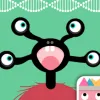Take a look inside 7 images
DNA Play
Pros: Students will enjoy observing and experimenting with cute creatures, and there's room to explore topics for future learning.
Cons: With limited play options, older students may long for more.
Bottom Line: Engaging DNA app will keep younger students' attention while they build a foundation of biology knowledge.
Teachers can use this app as an early introduction to genetics and biology for young students. Allow students to play with the app unrestricted for a while, and then start asking them questions. Draw their attention to how different kinds of creatures react to their experiences, and ask why they think that is. Have students compare creature reactions with other kids' creatures and encourage them to develop explanations for behavior.
Have students share their favorite creatures with each other and with the class, encouraging them to draw attention to how creature traits affect interaction with their surroundings. Allow students to share creatures' genetic codes with the class, so other students can try out specific combinations of genes. Since the app doesn't rely on reading skills, teachers can use it with prereading students, English language learners, and anyone who has trouble reading in English.
This app introduces younger students to the concept of DNA and how it affects what our bodies look like and what we can do. Students begin by completing the genetic combinations for the app's creatures, dictating color, size, and type of body, legs, arms, mouth, head, and eyes. There are over 200 billion combinations of traits. Once these are set, students can change the genes around to mutate the traits until they're satisfied with their creatures.
The app rotates through some short scenarios for the creature, all of which students can participate in and which include eating food, skateboarding, dancing to music, being in the dark, or encountering a spider or elephant. Observant students will learn how different creatures react differently to those experiences. Students can also share their complete creature genetic codes by first saving them to their photo libraries.
DNA Play is an open-ended play app for genetically designing creatures that doesn't rely on reading skills. It is well put together for early elementary school-age kids, and it encourages experimentation, study, and learning how combinations of genes affect abilities and traits. Students can change a creature's genes in the middle of a play sequence as well to see what difference that change will bring, such as how having more eyes might affect a creature who's near a spider.
Students will learn how different body traits can be advantages or disadvantages, such as how longer legs and arms make it easier to dance. They can also learn how one kind of creature can be scared of the dark while another, with a different set of physical traits, might not be. The app is a fantastic introduction to genetics for students and can form the basis for more involved conversations later about genetics and what makes up people and animals.















